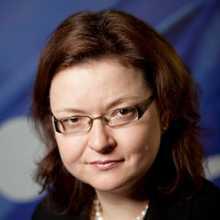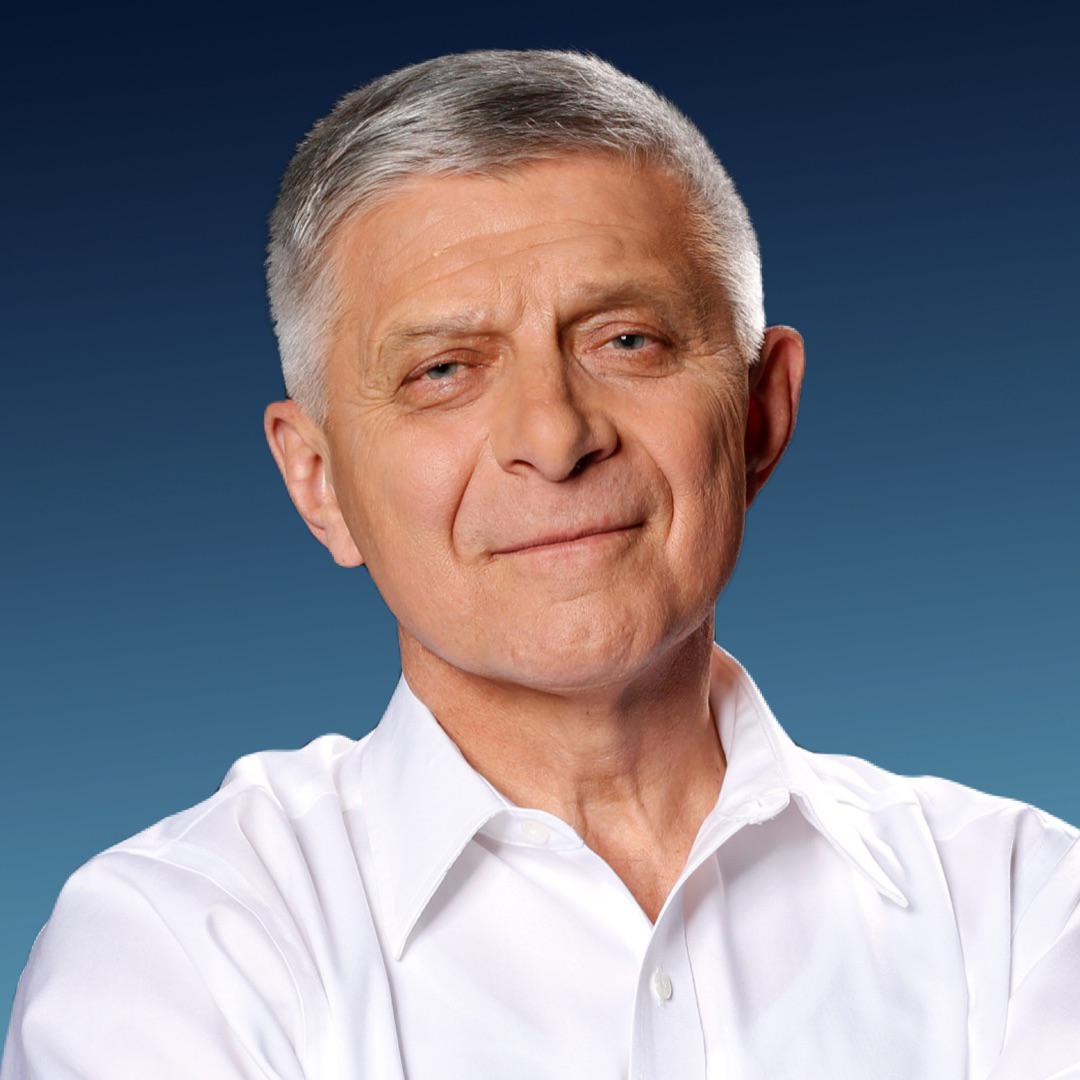Live from Warsaw: Addressing Challenges to Growth, Security, and Stability

Read the transcript
- 11:03 Thank you very, very much for the warm welcome from everyone.
- 11:11 Thank you for the hospitality and for showing me the city of Warsaw.
- 11:16 I want to thank the Warsaw School of Economics for hosting us today.
- 11:22 I am honored to be here to commend the people of Poland and Europe for your embrace of people
- 11:30 fleeing the war in Ukraine.
- 11:34 I feel deep solidarity with you and admire your generosity
- 11:38 in welcoming so many neighbors into your homes.
- 11:42 Dziękuję.
- 11:51 I first visited Warsaw in 1975, arriving by train via Prague, Bratislava, and Kraków.
- 12:00 As you know too well, times were harsh then – under the burden of socialism, Soviet
- 12:06 oppression, and their invasion of Czechoslovakia in 1968.
- 12:12 The protests and shortages that emerged brought about Poland’s Solidarity movement, which
- 12:19 ultimately changed the course of Eastern Europe and beyond.
- 12:24 We are again living through a dangerous period of overlapping crises and conflicts
- 12:29 with Poland near the center.
- 12:32 I have been deeply shocked and horrified at Russia’s invasion of Ukraine, the atrocities
- 12:38 committed against the civilian population, and the loss of life and livelihoods
- 12:43 for millions of Ukrainians.
- 12:46 The attacks on people and infrastructure are causing tremendous suffering, threatening
- 12:52 international peace and security, and endangering the basic social and economic needs
- 12:58 of people around the world.
- 13:01 I met with President Zelenskyy on February 19 in Munich and then spoke with him after
- 13:07 the invasion to discuss World Bank support for the people of Ukraine.
- 13:12 Since the invasion, the World Bank Group has provided fast-disbursing financial support
- 13:17 to Ukraine to help the government provide critical services to people, including wages
- 13:23 for hospital workers, pensions for the elderly, and social programs for the vulnerable.
- 13:29 Through IFC, we have provided immediate working capital for companies
- 13:35 providing supplies ton Ukraine.
- 13:38 I’m pleased to announce today that the World Bank is currently preparing
- 13:42 a nearly $1.5 billion operation for Ukraine to support continuation of
- 13:48 essential government services during the war.
- 13:51 This was enabled by yesterday’s approval of IDA19 support of $1 billion to Ukraine
- 13:58 and $100 million to Moldova by IDA donor and recipient countries.
- 14:05 The World Bank was created in 1944 to help Europe rebuild after World War II.
- 14:13 As we did then, we will be ready to help Ukraine with reconstruction when the time comes.
- 14:20 In the meantime, we are working to help Ukrainian refugees as they plan their return home; help
- 14:28 communities as they absorb Ukrainians; and help the many millions of internally displaced
- 14:35 persons in Ukraine who have lost their homes and livelihoods.
- 14:40 We are analyzing global impacts of the war in Ukraine, including the spike in food and
- 14:45 energy prices, and preparing a surge crisis response that will provide focused support
- 14:53 for developing countries.
- 14:55 The violence is unfortunately not confined to Ukraine.
- 15:00 Just over the last year, we have witnessed serious setbacks for development and security,
- 15:06 including Afghanistan’s collapse, Lebanon’s crisis, and coups and violence across the
- 15:14 Sahel, Ethiopia, Somalia, and Yemen.
- 15:18 Millions of Syrians are living in refugee camps in Jordan, Lebanon, and Turkey.
- 15:24 Inter-ethnic and inter-religious strife plagues Myanmar and other parts of Asia.
- 15:32 And in Latin America and the Caribbean, levels of crime and violence are alarmingly high,
- 15:37 with some urban and rural areas controlled by criminal gangs or drug cartels.
- 15:44 The trend toward insecurity is deeply concerning.
- 15:48 This year, 39 of the 189 member countries of the World Bank Group – 39 of 189 - are
- 15:56 experiencing open conflict situations or remain worryingly fragile.
- 16:02 The number of people living in conflict areas nearly doubled between 2007 and 2020.
- 16:09 Today, in the Middle East and North Africa, one in every five people lives in an area
- 16:15 affected by conflict.
- 16:18 This unraveling of security has brought a surge in the number of refugees, which more
- 16:24 than doubled over the last decade to exceed 30 million refugees in 2020.
- 16:30 The war in Ukraine has already displaced an additional 10 million people from their homes,
- 16:36 pushing more than 4 million people – primarily women and children – into neighboring countries,
- 16:43 most of them to Poland and Romania.
- 16:47 We recognize that each of the ongoing crises hits the vulnerable the hardest, often women
- 16:53 and girls.
- 16:54 And all the while, we are still suffering the health, economic, and social setbacks
- 17:00 of a global pandemic and economic shutdowns.
- 17:04 Millions of lives have been lost and millions more are suffering amid the massive reversals
- 17:10 in development that hit the poor particularly hard.
- 17:14 Since the outbreak of COVID-19, violence against women and girls has intensified.
- 17:20 Global indicators on food, nutrition, and health have worsened.
- 17:24 And children lost more than a year of education due to school closures, with 1.6 billion children
- 17:32 out of school globally at the peak of lockdowns, reversing a full decade of gains in human
- 17:39 capital.
- 17:41 Never have so many countries experienced a recession at once, suffering lost capital,
- 17:47 jobs, and livelihoods.
- 17:49 At the same time, inflation continues to accelerate,
- 17:53 reducing the real incomes of households around
- 17:55 the world, especially the poor.
- 17:58 The extraordinary monetary and fiscal policies that advanced economies have been implementing
- 18:04 to boost their demand, combined with supply constraints and disruptions, have fueled price
- 18:11 increases and have worsened inequality around the globe.
- 18:16 One measure that captures the growing concern of inflation and inequality is the stagnation
- 18:22 in real median income across much of the world.
- 18:26 Another measure is the likelihood that poverty increases will continue in 2022 as inflation,
- 18:33 currency depreciation, and high food prices hit home.
- 18:38 The war in Ukraine and its consequences are also creating sudden shortages of energy,
- 18:44 fertilizer, and food, pitting people against each other and their governments.
- 18:49 Even people who are physically distant from this conflict are feeling its impacts.
- 18:55 Food price spikes hit everyone and are devastating for the poorest and most vulnerable.
- 19:00 For every one percentage point increase in food prices, 10 million people are expected
- 19:06 to fall into extreme poverty.
- 19:09 The rich can afford suddenly expensive staples, but the poor cannot.
- 19:15 Malnutrition is expected to grow, and its effects will be the hardest to reverse in
- 19:20 children.
- 19:22 Trade disruptions have already sent grain and commodity prices soaring.
- 19:28 Wheat exports from Black Sea ports have been sharply curtailed.
- 19:33 And intense drought in South America is reducing global food production.
- 19:39 Global food commodity markets are large and well-established, and
- 19:45 they tend to self-adjust to disruptions in production.
- 19:49 However, additional factors are making the current food supply problems more acute
- 19:55 namely the supply of fertilizers, energy prices, and self-imposed food export restrictions.
- 20:03 Fertilizer prices are dependent on natural gas prices, which have surged.
- 20:08 As LNG is shipped to Europe, LNG shortages are occurring elsewhere, reducing fertilizer
- 20:16 production, and disrupting the sowing season and harvest productivity.
- 20:23 Russia and Belarus are both large fertilizer producers, adding materially to the problem.
- 20:31 The financial repercussions of the energy shock are intertwined
- 20:34 with the global community’s efforts on climate change.
- 20:38 Russia has been an important source for the world’s energy, including oil,
- 20:43 coal, and gas – the latter supplying Europe through a network of pipelines.
- 20:49 I’ve been pleased to see Europe follow a path toward diversifying its energy mix away
- 20:55 from Russia and considering LNG imports and nuclear power for electricity baseload,
- 21:03 but these take time.
- 21:05 The rapid addition of major new energy production in Europe and other parts of the world
- 21:11 will be a necessary ingredient for global recovery and energy security in Europe.
- 21:19 The World Bank Group strongly supports the integration of climate and development goals.
- 21:25 This recognizes the urgency of growth and development at the core of our mission of
- 21:31 alleviating poverty and boosting shared prosperity;
- 21:35 and the global community’s pledges to slow
- 21:38 the growth in human-linked greenhouse gas emissions.
- 21:43 These pledges for global public goods will require hundreds of complex, multi-decade
- 21:49 projects that reduce emissions and are funded by the global community.
- 21:54 We are working to tackle these challenges through analytical work, including our Country
- 22:00 Climate and Development Reports and our Infrastructure Sector Assessment Programs.
- 22:06 We are pleased to support Poland’s efforts to increase energy efficiency and continue
- 22:12 its transition away from coal.
- 22:15 On the economic front, trends are not encouraging.
- 22:18 Prior to the war in Ukraine, the recovery in 2022 was already losing momentum due to
- 22:24 rising inflation and lingering supply bottlenecks.
- 22:27 While advanced economies were expected to return almost to their pre-pandemic growth
- 22:32 rates in 2023, developing economies were lagging substantially behind.
- 22:39 The war in Ukraine and the COVID-19 lockdowns in China are further reducing the recovery path.
- 22:47 Of concern, the repercussions are worsening the inequality as the war affects commodity
- 22:52 and financial markets, trade, and migration linkages, and investor and consumer confidence.
- 23:00 Advanced economies with well-developed social protection systems
- 23:04 are cushioning parts of their populations from the damage from inflation
- 23:09 and trade blockages, but poorer countries have limited fiscal resources
- 23:14 and weaker systems to support those in need.
- 23:18 Currency depreciations and inflation are hitting the poor hard,
- 23:23 causing fast increases in 2022 poverty rates.
- 23:28 Adding to the burden, developing country debt has risen sharply to a 50-year high—at roughly
- 23:34 250 percent of government revenues.
- 23:38 Debt vulnerabilities are particularly acute in low-income countries, where sixty percent
- 23:43 are already experiencing or at high risk of debt distress.
- 23:49 Most emerging market and developing economies are ill-prepared to face the coming debt shock.
- 23:56 Exposures to financial sector risk are opaque at this point, but one measure, the cost of
- 24:02 insuring against default in emerging markets, has reached its highest point since the onset
- 24:09 of the pandemic.
- 24:10 As we assess these overlapping crises and prepare for the Spring Meetings of the World
- 24:15 Bank Group and the IMF next week, I want to highlight some areas for action.
- 24:22 First, to effectively allocate capital.
- 24:26 The problem of inequality and severe concentration of wealth in narrow segments
- 24:31 of the global population is worsening.
- 24:34 Trillions of dollars of debt and capital are
- 24:36 being guided by advanced governments to over-capitalized
- 24:40 sectors, harming growth, supply chains, jobs, and median incomes.
- 24:46 The result is deepening inequality through the massive misallocation of global capital
- 24:52 away from small businesses, working capital and development.
- 24:57 I call on the governments and central banks of the advanced economies to alter fiscal,
- 25:03 monetary, and financial regulatory policies that are concentrating wealth and income,
- 25:09 misallocating capital, and fueling inflation.
- 25:14 Second is to promote growth and production.
- 25:17 A primary path for global recovery is to create policies, financing, and innovation that invite
- 25:23 investment inflows, allow the investment base to broaden, and encourage production to increase.
- 25:31 This defines an effective response to shortages and high prices.
- 25:37 Decentralized allocation of capital and policies
- 25:40 that foster currency stability are key ingredients.
- 25:43 Recent currency depreciations and the slide into multiple exchange rates are strong reminders
- 25:51 that sound monetary and fiscal policies are vital.
- 25:54 Importantly, we need to redouble our growth efforts on public and private sector solutions
- 26:00 that provide clean water, dependable electricity, sustainable agriculture, quality education,
- 26:08 health emergency preparedness, and digital access.
- 26:13 Third is to keep markets open.
- 26:16 In addition to large increases in diversified energy production, countries should also release
- 26:22 the most binding restrictions on their imports and exports.
- 26:27 This is an important step in shortening the crisis and strengthening the recovery.
- 26:32 Most of the trade barriers protect the privileged at the expense of the rest of society,
- 26:38 worsening inequality.
- 26:40 This includes quotas, high tariff rates, high export taxes, and subsidies that distort trade.
- 26:48 Each of these causes asymmetrical damage to the poor – from rice, peanut, and sugar
- 26:55 import quotas; to costly production subsidies for cotton and ethanol; to domestic content
- 27:02 requirements that undercut productivity.
- 27:07 Last, but not least, is a steadfast commitment to security and stability.
- 27:12 Durable peace takes constant effort to strengthen institutions, reduce inequality,
- 27:19 raise living standards, and provide defenses.
- 27:22 In the alternative, security crises trigger massive
- 27:26 increases in poverty and decimate the middle class.
- 27:31 As we look forward to Ukraine’s rebuilding, that’s an effort we all desire,
- 27:37 I would like to conclude by recalling Poland’s experience.
- 27:40 Even while confronting a failed communist system of central planning,
- 27:45 Poland began introducing market mechanisms.
- 27:49 Amid censorship, it was able to create a vibrant social and civil movement of Solidarity.
- 27:56 I saw this first-hand in 1975 in the enthusiasm Poles showed me and other foreigners.
- 28:04 The determination and hard work of the Polish people paid off.
- 28:08 Decades of preparation had them ready to proceed quickly
- 28:12 as soon as there was an opening to freedom.
- 28:15 Poland provided strong education, liberalized the economy, privatized state-owned enterprises,
- 28:22 committed to currency stability, attracted investment,
- 28:25 and became internationally competitive.
- 28:28 The transition from a planned economy to a market-based one brought down inflation from
- 28:34 more than 500 percent in 1990 to less than 10 percent in 1999, and then kept inflation low.
- 28:43 Progress was remarkably rapid because
- 28:46 it was anchored in shared goals and aspirations,
- 28:50 valuing peace, freedom, and economic liberalization.
- 28:55 These values will be critical as Poland works through the many overlapping crises
- 29:00 facing the region and the world.
- 29:02 Economic transformation matters in part because of its impact on society.
- 29:09 Poland’s spontaneous generosity – at the national and municipal levels –
- 29:14 toward Ukrainian refugees is an inspiration.
- 29:19 When Poland’s economic transformation occurred,
- 29:22 Poland received strong support from the international
- 29:25 community, and I’m sure Ukraine will too.
- 29:29 Concerted international action against conflict
- 29:32 and violence requires that international institutions
- 29:36 focus on the roles in which they have a comparative
- 29:39 advantage, including monitoring cross-border
- 29:43 financial flows, providing humanitarian assistance,
- 29:47 and building capacity on the ground to strategically
- 29:50 allocate and manage peace-keeping operations.
- 29:54 Much of the action will necessarily be at the country level.
- 29:59 Our comparative advantage at the World Bank Group is to deliver on the ground and share
- 30:05 good practices, working closely with governments, civil society, and the private sector.
- 30:11 You should count on us, as we count on you
- 30:15 to support innovative approaches to the front lines of development.
- 30:20 It is here that we can win the battles against the multiple crises we are facing.
- 30:25 I want to thank you all very much.
- 30:28 Thank you.
Live from Warsaw: Addressing Challenges to Growth, Security, and Stability
- Watch in Polish | العربية | Français | Español -
In his speech, “Addressing Challenges to Growth, Security, and Stability,” President Malpass discussed how conflict, COVID-19, and climate change have created unprecedented challenges for developing countries, hurting the poorest and most vulnerable people and communities. He outlined how, moving forward, crisis recovery and longer-term development requires economic transformation, investment in human capital, and security and stability underpinned by support from the international community.
This speech was broadcast live from Poland, a country that has taken in over 2.3 million Ukrainian refugees fleeing war.
Watch the World Bank Group Public Events
Visit the Official Spring Meetings 2022 website
Visit the World Bank Group website
Speakers
Moderator
Read the transcript
- 11:03 Thank you very, very much for the warm welcome from everyone.
- 11:11 Thank you for the hospitality and for showing me the city of Warsaw.
- 11:16 I want to thank the Warsaw School of Economics for hosting us today.
- 11:22 I am honored to be here to commend the people of Poland and Europe for your embrace of people
- 11:30 fleeing the war in Ukraine.
- 11:34 I feel deep solidarity with you and admire your generosity
- 11:38 in welcoming so many neighbors into your homes.
- 11:42 Dziękuję.
- 11:51 I first visited Warsaw in 1975, arriving by train via Prague, Bratislava, and Kraków.
- 12:00 As you know too well, times were harsh then – under the burden of socialism, Soviet
- 12:06 oppression, and their invasion of Czechoslovakia in 1968.
- 12:12 The protests and shortages that emerged brought about Poland’s Solidarity movement, which
- 12:19 ultimately changed the course of Eastern Europe and beyond.
- 12:24 We are again living through a dangerous period of overlapping crises and conflicts
- 12:29 with Poland near the center.
- 12:32 I have been deeply shocked and horrified at Russia’s invasion of Ukraine, the atrocities
- 12:38 committed against the civilian population, and the loss of life and livelihoods
- 12:43 for millions of Ukrainians.
- 12:46 The attacks on people and infrastructure are causing tremendous suffering, threatening
- 12:52 international peace and security, and endangering the basic social and economic needs
- 12:58 of people around the world.
- 13:01 I met with President Zelenskyy on February 19 in Munich and then spoke with him after
- 13:07 the invasion to discuss World Bank support for the people of Ukraine.
- 13:12 Since the invasion, the World Bank Group has provided fast-disbursing financial support
- 13:17 to Ukraine to help the government provide critical services to people, including wages
- 13:23 for hospital workers, pensions for the elderly, and social programs for the vulnerable.
- 13:29 Through IFC, we have provided immediate working capital for companies
- 13:35 providing supplies ton Ukraine.
- 13:38 I’m pleased to announce today that the World Bank is currently preparing
- 13:42 a nearly $1.5 billion operation for Ukraine to support continuation of
- 13:48 essential government services during the war.
- 13:51 This was enabled by yesterday’s approval of IDA19 support of $1 billion to Ukraine
- 13:58 and $100 million to Moldova by IDA donor and recipient countries.
- 14:05 The World Bank was created in 1944 to help Europe rebuild after World War II.
- 14:13 As we did then, we will be ready to help Ukraine with reconstruction when the time comes.
- 14:20 In the meantime, we are working to help Ukrainian refugees as they plan their return home; help
- 14:28 communities as they absorb Ukrainians; and help the many millions of internally displaced
- 14:35 persons in Ukraine who have lost their homes and livelihoods.
- 14:40 We are analyzing global impacts of the war in Ukraine, including the spike in food and
- 14:45 energy prices, and preparing a surge crisis response that will provide focused support
- 14:53 for developing countries.
- 14:55 The violence is unfortunately not confined to Ukraine.
- 15:00 Just over the last year, we have witnessed serious setbacks for development and security,
- 15:06 including Afghanistan’s collapse, Lebanon’s crisis, and coups and violence across the
- 15:14 Sahel, Ethiopia, Somalia, and Yemen.
- 15:18 Millions of Syrians are living in refugee camps in Jordan, Lebanon, and Turkey.
- 15:24 Inter-ethnic and inter-religious strife plagues Myanmar and other parts of Asia.
- 15:32 And in Latin America and the Caribbean, levels of crime and violence are alarmingly high,
- 15:37 with some urban and rural areas controlled by criminal gangs or drug cartels.
- 15:44 The trend toward insecurity is deeply concerning.
- 15:48 This year, 39 of the 189 member countries of the World Bank Group – 39 of 189 - are
- 15:56 experiencing open conflict situations or remain worryingly fragile.
- 16:02 The number of people living in conflict areas nearly doubled between 2007 and 2020.
- 16:09 Today, in the Middle East and North Africa, one in every five people lives in an area
- 16:15 affected by conflict.
- 16:18 This unraveling of security has brought a surge in the number of refugees, which more
- 16:24 than doubled over the last decade to exceed 30 million refugees in 2020.
- 16:30 The war in Ukraine has already displaced an additional 10 million people from their homes,
- 16:36 pushing more than 4 million people – primarily women and children – into neighboring countries,
- 16:43 most of them to Poland and Romania.
- 16:47 We recognize that each of the ongoing crises hits the vulnerable the hardest, often women
- 16:53 and girls.
- 16:54 And all the while, we are still suffering the health, economic, and social setbacks
- 17:00 of a global pandemic and economic shutdowns.
- 17:04 Millions of lives have been lost and millions more are suffering amid the massive reversals
- 17:10 in development that hit the poor particularly hard.
- 17:14 Since the outbreak of COVID-19, violence against women and girls has intensified.
- 17:20 Global indicators on food, nutrition, and health have worsened.
- 17:24 And children lost more than a year of education due to school closures, with 1.6 billion children
- 17:32 out of school globally at the peak of lockdowns, reversing a full decade of gains in human
- 17:39 capital.
- 17:41 Never have so many countries experienced a recession at once, suffering lost capital,
- 17:47 jobs, and livelihoods.
- 17:49 At the same time, inflation continues to accelerate,
- 17:53 reducing the real incomes of households around
- 17:55 the world, especially the poor.
- 17:58 The extraordinary monetary and fiscal policies that advanced economies have been implementing
- 18:04 to boost their demand, combined with supply constraints and disruptions, have fueled price
- 18:11 increases and have worsened inequality around the globe.
- 18:16 One measure that captures the growing concern of inflation and inequality is the stagnation
- 18:22 in real median income across much of the world.
- 18:26 Another measure is the likelihood that poverty increases will continue in 2022 as inflation,
- 18:33 currency depreciation, and high food prices hit home.
- 18:38 The war in Ukraine and its consequences are also creating sudden shortages of energy,
- 18:44 fertilizer, and food, pitting people against each other and their governments.
- 18:49 Even people who are physically distant from this conflict are feeling its impacts.
- 18:55 Food price spikes hit everyone and are devastating for the poorest and most vulnerable.
- 19:00 For every one percentage point increase in food prices, 10 million people are expected
- 19:06 to fall into extreme poverty.
- 19:09 The rich can afford suddenly expensive staples, but the poor cannot.
- 19:15 Malnutrition is expected to grow, and its effects will be the hardest to reverse in
- 19:20 children.
- 19:22 Trade disruptions have already sent grain and commodity prices soaring.
- 19:28 Wheat exports from Black Sea ports have been sharply curtailed.
- 19:33 And intense drought in South America is reducing global food production.
- 19:39 Global food commodity markets are large and well-established, and
- 19:45 they tend to self-adjust to disruptions in production.
- 19:49 However, additional factors are making the current food supply problems more acute
- 19:55 namely the supply of fertilizers, energy prices, and self-imposed food export restrictions.
- 20:03 Fertilizer prices are dependent on natural gas prices, which have surged.
- 20:08 As LNG is shipped to Europe, LNG shortages are occurring elsewhere, reducing fertilizer
- 20:16 production, and disrupting the sowing season and harvest productivity.
- 20:23 Russia and Belarus are both large fertilizer producers, adding materially to the problem.
- 20:31 The financial repercussions of the energy shock are intertwined
- 20:34 with the global community’s efforts on climate change.
- 20:38 Russia has been an important source for the world’s energy, including oil,
- 20:43 coal, and gas – the latter supplying Europe through a network of pipelines.
- 20:49 I’ve been pleased to see Europe follow a path toward diversifying its energy mix away
- 20:55 from Russia and considering LNG imports and nuclear power for electricity baseload,
- 21:03 but these take time.
- 21:05 The rapid addition of major new energy production in Europe and other parts of the world
- 21:11 will be a necessary ingredient for global recovery and energy security in Europe.
- 21:19 The World Bank Group strongly supports the integration of climate and development goals.
- 21:25 This recognizes the urgency of growth and development at the core of our mission of
- 21:31 alleviating poverty and boosting shared prosperity;
- 21:35 and the global community’s pledges to slow
- 21:38 the growth in human-linked greenhouse gas emissions.
- 21:43 These pledges for global public goods will require hundreds of complex, multi-decade
- 21:49 projects that reduce emissions and are funded by the global community.
- 21:54 We are working to tackle these challenges through analytical work, including our Country
- 22:00 Climate and Development Reports and our Infrastructure Sector Assessment Programs.
- 22:06 We are pleased to support Poland’s efforts to increase energy efficiency and continue
- 22:12 its transition away from coal.
- 22:15 On the economic front, trends are not encouraging.
- 22:18 Prior to the war in Ukraine, the recovery in 2022 was already losing momentum due to
- 22:24 rising inflation and lingering supply bottlenecks.
- 22:27 While advanced economies were expected to return almost to their pre-pandemic growth
- 22:32 rates in 2023, developing economies were lagging substantially behind.
- 22:39 The war in Ukraine and the COVID-19 lockdowns in China are further reducing the recovery path.
- 22:47 Of concern, the repercussions are worsening the inequality as the war affects commodity
- 22:52 and financial markets, trade, and migration linkages, and investor and consumer confidence.
- 23:00 Advanced economies with well-developed social protection systems
- 23:04 are cushioning parts of their populations from the damage from inflation
- 23:09 and trade blockages, but poorer countries have limited fiscal resources
- 23:14 and weaker systems to support those in need.
- 23:18 Currency depreciations and inflation are hitting the poor hard,
- 23:23 causing fast increases in 2022 poverty rates.
- 23:28 Adding to the burden, developing country debt has risen sharply to a 50-year high—at roughly
- 23:34 250 percent of government revenues.
- 23:38 Debt vulnerabilities are particularly acute in low-income countries, where sixty percent
- 23:43 are already experiencing or at high risk of debt distress.
- 23:49 Most emerging market and developing economies are ill-prepared to face the coming debt shock.
- 23:56 Exposures to financial sector risk are opaque at this point, but one measure, the cost of
- 24:02 insuring against default in emerging markets, has reached its highest point since the onset
- 24:09 of the pandemic.
- 24:10 As we assess these overlapping crises and prepare for the Spring Meetings of the World
- 24:15 Bank Group and the IMF next week, I want to highlight some areas for action.
- 24:22 First, to effectively allocate capital.
- 24:26 The problem of inequality and severe concentration of wealth in narrow segments
- 24:31 of the global population is worsening.
- 24:34 Trillions of dollars of debt and capital are
- 24:36 being guided by advanced governments to over-capitalized
- 24:40 sectors, harming growth, supply chains, jobs, and median incomes.
- 24:46 The result is deepening inequality through the massive misallocation of global capital
- 24:52 away from small businesses, working capital and development.
- 24:57 I call on the governments and central banks of the advanced economies to alter fiscal,
- 25:03 monetary, and financial regulatory policies that are concentrating wealth and income,
- 25:09 misallocating capital, and fueling inflation.
- 25:14 Second is to promote growth and production.
- 25:17 A primary path for global recovery is to create policies, financing, and innovation that invite
- 25:23 investment inflows, allow the investment base to broaden, and encourage production to increase.
- 25:31 This defines an effective response to shortages and high prices.
- 25:37 Decentralized allocation of capital and policies
- 25:40 that foster currency stability are key ingredients.
- 25:43 Recent currency depreciations and the slide into multiple exchange rates are strong reminders
- 25:51 that sound monetary and fiscal policies are vital.
- 25:54 Importantly, we need to redouble our growth efforts on public and private sector solutions
- 26:00 that provide clean water, dependable electricity, sustainable agriculture, quality education,
- 26:08 health emergency preparedness, and digital access.
- 26:13 Third is to keep markets open.
- 26:16 In addition to large increases in diversified energy production, countries should also release
- 26:22 the most binding restrictions on their imports and exports.
- 26:27 This is an important step in shortening the crisis and strengthening the recovery.
- 26:32 Most of the trade barriers protect the privileged at the expense of the rest of society,
- 26:38 worsening inequality.
- 26:40 This includes quotas, high tariff rates, high export taxes, and subsidies that distort trade.
- 26:48 Each of these causes asymmetrical damage to the poor – from rice, peanut, and sugar
- 26:55 import quotas; to costly production subsidies for cotton and ethanol; to domestic content
- 27:02 requirements that undercut productivity.
- 27:07 Last, but not least, is a steadfast commitment to security and stability.
- 27:12 Durable peace takes constant effort to strengthen institutions, reduce inequality,
- 27:19 raise living standards, and provide defenses.
- 27:22 In the alternative, security crises trigger massive
- 27:26 increases in poverty and decimate the middle class.
- 27:31 As we look forward to Ukraine’s rebuilding, that’s an effort we all desire,
- 27:37 I would like to conclude by recalling Poland’s experience.
- 27:40 Even while confronting a failed communist system of central planning,
- 27:45 Poland began introducing market mechanisms.
- 27:49 Amid censorship, it was able to create a vibrant social and civil movement of Solidarity.
- 27:56 I saw this first-hand in 1975 in the enthusiasm Poles showed me and other foreigners.
- 28:04 The determination and hard work of the Polish people paid off.
- 28:08 Decades of preparation had them ready to proceed quickly
- 28:12 as soon as there was an opening to freedom.
- 28:15 Poland provided strong education, liberalized the economy, privatized state-owned enterprises,
- 28:22 committed to currency stability, attracted investment,
- 28:25 and became internationally competitive.
- 28:28 The transition from a planned economy to a market-based one brought down inflation from
- 28:34 more than 500 percent in 1990 to less than 10 percent in 1999, and then kept inflation low.
- 28:43 Progress was remarkably rapid because
- 28:46 it was anchored in shared goals and aspirations,
- 28:50 valuing peace, freedom, and economic liberalization.
- 28:55 These values will be critical as Poland works through the many overlapping crises
- 29:00 facing the region and the world.
- 29:02 Economic transformation matters in part because of its impact on society.
- 29:09 Poland’s spontaneous generosity – at the national and municipal levels –
- 29:14 toward Ukrainian refugees is an inspiration.
- 29:19 When Poland’s economic transformation occurred,
- 29:22 Poland received strong support from the international
- 29:25 community, and I’m sure Ukraine will too.
- 29:29 Concerted international action against conflict
- 29:32 and violence requires that international institutions
- 29:36 focus on the roles in which they have a comparative
- 29:39 advantage, including monitoring cross-border
- 29:43 financial flows, providing humanitarian assistance,
- 29:47 and building capacity on the ground to strategically
- 29:50 allocate and manage peace-keeping operations.
- 29:54 Much of the action will necessarily be at the country level.
- 29:59 Our comparative advantage at the World Bank Group is to deliver on the ground and share
- 30:05 good practices, working closely with governments, civil society, and the private sector.
- 30:11 You should count on us, as we count on you
- 30:15 to support innovative approaches to the front lines of development.
- 30:20 It is here that we can win the battles against the multiple crises we are facing.
- 30:25 I want to thank you all very much.
- 30:28 Thank you.
The Spring Meetings bring together leaders from government, business, international organizations, and civil society, along with a diverse group of experts, to discuss global challenges and the path ahead. Watch the replay of our events dedicated to international development.
Apr. 12: Addressing Challenges
Apr. 19: Responding to Global Shocks
Apr. 20: Opening Press Conference
Apr. 20: The Digital Revolution
Apr. 21: Financing Climate Action
Apr. 21: Support to Ukraine
Apr. 22: Fragility
Apr. 22: Preserving Open Trade
Apr. 23: Human Capital
Available with simultaneous interpretation in Arabic, French and Spanish.






